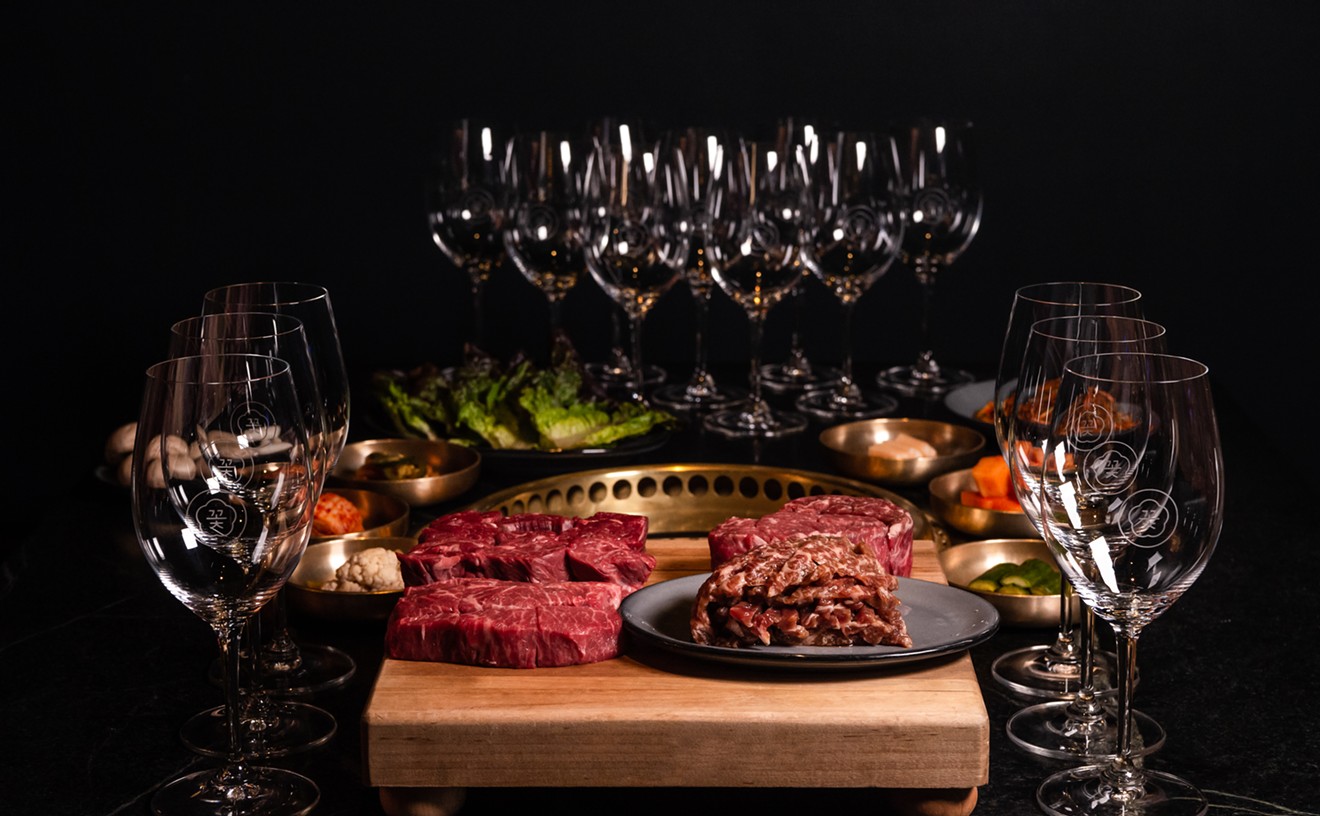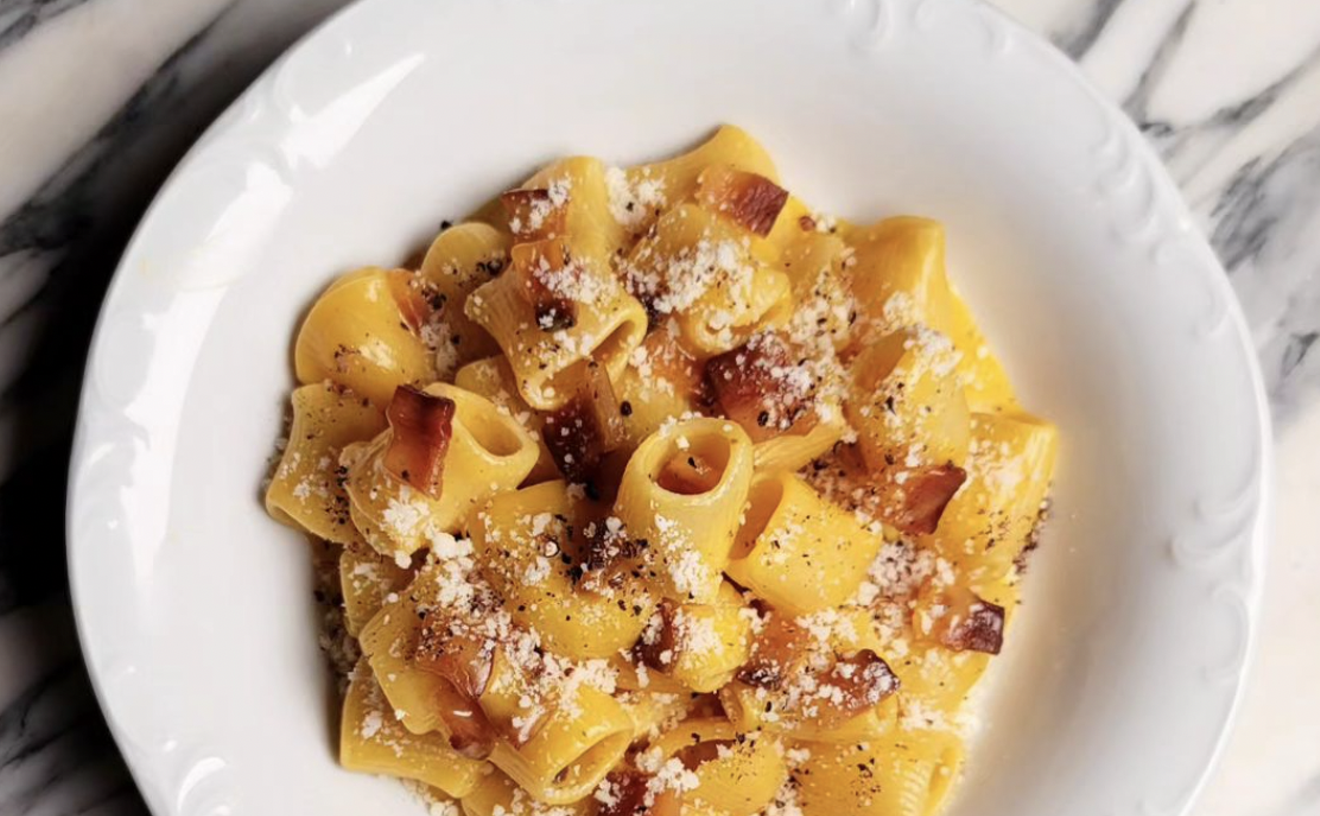There's no better way to start a meal than with a puff of steam floating off a bamboo tray packed with swollen soup dumplings.
At Momi Gyoza Bar, which joined the fray in Brickell two months ago, chef and owner Jeffrey Chen's version of xiao long bao relies on the tacky, creamy broth from his ramen shop around the corner. Minced pork and shredded cabbage combine with a reduction of the stock made from pork bones that's often steeped a full day and night. When cooled, the mixture settles into a gel. But after being twisted up with handmade skins and steamed, the little packets tremble before gushing their savory insides.
See also: Momi Oyster, Momi Wine Joining Jeffrey Chen's Expanding Brickell Empire
The same broth has been the heart of his $24 bowls of soup -- filled with ingredients like oxtail, pork belly, and the fermented soybeans called natto -- at Momi Ramen since the place opened in 2012. The following year, he opened Sumi, a yakitori restaurant in the neighboring brick building that served hamachi collar sourced from Tokyo's Tsukiji Market and grilled over binchotan charcoal.
Running both restaurants and constantly traveling to Asia proved too ambitious for the laconic Chen. He sold Sumi in late 2013 but kept Momi Ramen.
Late last year, though, the obsessive 52-year-old, whose first passion is mechanical engineering, decided to make another try at expanding his empire. He bought a South Miami Avenue building that once housed an Italian restaurant around the corner from Momi. He refitted the now-cash-only space with a hulking stone bar and communal tables lined with quivers of chopsticks and illuminated by LED corkscrews tucked inside dangling test tubes. He named it Momi Gyoza -- a term for a Japanese variety of dumpling -- because of his love for the dish.
Chen calls the Japanese chicken, pork, and seafood gyoza a natural companion to ramen. They are a staple at the soup shops where he toiled in that island nation for a decade. To make them, he modified pasta machines and rolled out the paper-thin dough that includes Japanese rice and wheat flour. He created special molds to ensure each gyoza is a mirror image.
The handmade Chinese varieties, like the soup dumplings, are far more memorable than the bland gyoza, which cost more than a buck apiece. Unlike gyoza, which come by the dozen, these treasures are ordered and sold individually. The crab and shrimp version arrives in a football-shaped packet with an almost translucent skin. Chen uses only yamaimo -- a starchy, creamy Japanese mountain potato -- to bind the filler. He avoids ingredients like soy sauce and sesame oil.
The pleated, crescent-shaped pickled vegetable and mushroom dumpling has a unique tang. While most dumplings include an intoxicating combination of meat and salt, these bulk up with mushrooms, mustard greens, tiny cucumber matchsticks, and red carrot slivers. Some of the tart, barely salty pickling liquid rides along, creating the soup dumpling's vegetarian iteration.
Other Chinese classics, like har gao and the open-faced variety called shumai, are also impressive. The former includes five snow-white dumplings with diced shrimp, again bound with yamaimo, peeking through gossamer skins of tapioca and wheat starch. Several open-faced iterations are presented throughout the menu. The best carry a savory pork paste dotted with tiny flecks of wasabi leaves that set nostrils alight. The dumplings are presented in cupped, bundled-up skins tinted green thanks to an infusion of fresh soybean juice. It's easy to spot fellow diners enjoying them by their watering eyes and wide grins.
As at his other restaurants, Chen wields an arsenal of palate-jarring, addictive dishes mixed with experimental, sometimes less successful offerings. It's unclear how long his kamameshi -- a $20 bowl of rice slowly cooked in a titanium kettle with a splash of the dried fish and seaweed tea called dashi -- will last on the menu. It was a common meal when he lived in northern Japan and one he knew would be a risk to serve here. He has embellished it with toppings such as barbecued eel and braised pig ears in hopes it will catch on. If it doesn't, there's always another idea on the horizon.
- Eel hot-pot rice $21
- Assorted steamed and pan-fried gyoza $13.99
- Pickled vegetable and mushroom dumpling $3.99
- Crab and shrimp dumpling $4.50
- Pork and vegetable dumpling $3.99
- Crystal shrimp har gao $9
- Wasabi pork shumai $9
For more follow Zach on Twitter or Instagram.
Follow us on Facebook at Miami New Times Food & Drink.










